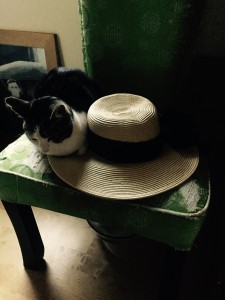 Today’s wordcount:5008
Today’s wordcount:5008
Current Hearts of Tabat wordcount: 95071
Total word count for the week: 5008
Total word count for this retreat: 22085
Worked on Hearts of Tabat, story “District of Brass”
Time spent on SFWA email, discussion boards, other stuff: 30 minutes
10263 steps, 67 flights of stairs
From today, the beginning of a Serendib story, “District of Brass”
In Serendib, there is the District of Brass, and there the traveler can find marvelous machines, made not just of that metal, but many of the lesser metals, like iron and aluminum and the first degree of steel. The tinkerers of the District of Brass can make any machine, but always after their fashion, which is cogs and gears and wheels within wheels, not the crystals and lights of other lands.
Once there was a tinkerer there, who had not come from elsewhere, but was native to the city, which meant that anything could happen with her. Her name was Pye and she was a clever girl, who loved to puzzle things out, and by the time she was six, she had created mechanisms that performed not only all her own chores, but those of her slower siblings. She was an innovator, and many disliked her intensely for her habit of looking at a design and saying, in the most reasonable of tones, “Yes, that’s clever enough, but what if you did it this way?” before pointing out any number of improvements.
This dislike was exacerbated by her main failing, which was that she was incapable of puzzling out people as expertly as she did machines ““ in fact, people were mysteries to her, always saying one thing and then acting another way. There were rules to existence, and they seemed to change so often, or at least be conditional and dependent to the point where there was no telling what to do at any given moment without standing and thinking for a good ten minutes about it.
While her family was fond enough of her, though most preferred not to spend too much time in her company, since the designs she was improving were so often their own, Pye had no friends, only acquaintances among her age-mates and other school friends, and the nurse who had raised her between the ages of eight and fourteen, and now lived in an elderquarter of a more advanced age, where the medical care was far better.
Pye would have liked to have said that she didn’t care about her lack of friends, but the truth is that she cared in two ways: one, she would have liked to have had friends, and two, she thought it an abnormality in herself not to have accumulated such things already.










7 Responses
Sandra Odell liked this on Facebook.
Chris Furst liked this on Facebook.
Rex Reese liked this on Facebook.
Miriah Hetherington liked this on Facebook.
Sara Pelfrey liked this on Facebook.
Darlene Odell liked this on Facebook.
Wayne Rambo liked this on Facebook.